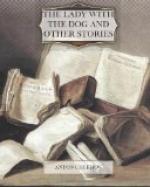Left alone, Kovrin settled himself more comfortably on the sofa and took up the articles. The title of one was “On Intercropping”; of another, “A few Words on the Remarks of Monsieur Z. concerning the Trenching of the Soil for a New Garden”; a third, “Additional Matter concerning Grafting with a Dormant Bud”; and they were all of the same sort. But what a restless, jerky tone! What nervous, almost hysterical passion! Here was an article, one would have thought, with most peaceable and impersonal contents: the subject of it was the Russian Antonovsky Apple. But Yegor Semyonitch began it with “Audiatur altera pars,” and finished it with “Sapienti sat”; and between these two quotations a perfect torrent of venomous phrases directed “at the learned ignorance of our recognised horticultural authorities, who observe Nature from the height of their university chairs,” or at Monsieur Gaucher, “whose success has been the work of the vulgar and the dilettanti.” “And then followed an inappropriate, affected, and insincere regret that peasants who stole fruit and broke the branches could not nowadays be flogged.
“It is beautiful, charming, healthy work, but even in this there is strife and passion,” thought Kovrin, “I suppose that everywhere and in all careers men of ideas are nervous, and marked by exaggerated sensitiveness. Most likely it must be so.”
He thought of Tanya, who was so pleased with Yegor Semyonitch’s articles. Small, pale, and so thin that her shoulder-blades stuck out, her eyes, wide and open, dark and intelligent, had an intent gaze, as though looking for something. She walked like her father with a little hurried step. She talked a great deal and was fond of arguing, accompanying every phrase, however insignificant, with expressive mimicry and gesticulation. No doubt she was nervous in the extreme.
Kovrin went on reading the articles, but he understood nothing of them, and flung them aside. The same pleasant excitement with which he had earlier in the evening danced the mazurka and listened to the music was now mastering him again and rousing a multitude of thoughts. He got up and began walking about the room, thinking about the black monk. It occurred to him that if this strange, supernatural monk had appeared to him only, that meant that he was ill and had reached the point of having hallucinations. This reflection frightened him, but not for long.
“But I am all right, and I am doing no harm to any one; so there is no harm in my hallucinations,” he thought; and he felt happy again.
He sat down on the sofa and clasped his hands round his head. Restraining the unaccountable joy which filled his whole being, he then paced up and down again, and sat down to his work. But the thought that he read in the book did not satisfy him. He wanted something gigantic, unfathomable, stupendous. Towards morning he undressed and reluctantly went to bed: he ought to sleep.




